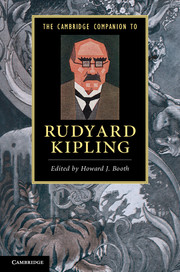Book contents
- Frontmatter
- Introduction
- 1 Kipling and the fin-de-siécle
- 2 India and empire
- 3 Kipling’s very special relationship: Kipling in America, America in Kipling
- 4 Science and technology
- 5 Kipling and gender
- 6 Kipling and war
- 7 Kipling as a children's writer and the Jungle Books
- 8 'Nine and sixty ways’: Kipling, ventriloquist poet
- 9 Kim
- 10 The later short fiction
- 11 Kipling and postcolonial literature
- 12 Kipling and the visual: illustrations and adaptations
- 13 Reading Kipling in India
- Further reading
- Index
Introduction
Published online by Cambridge University Press: 28 September 2011
- Frontmatter
- Introduction
- 1 Kipling and the fin-de-siécle
- 2 India and empire
- 3 Kipling’s very special relationship: Kipling in America, America in Kipling
- 4 Science and technology
- 5 Kipling and gender
- 6 Kipling and war
- 7 Kipling as a children's writer and the Jungle Books
- 8 'Nine and sixty ways’: Kipling, ventriloquist poet
- 9 Kim
- 10 The later short fiction
- 11 Kipling and postcolonial literature
- 12 Kipling and the visual: illustrations and adaptations
- 13 Reading Kipling in India
- Further reading
- Index
Summary
There is no other literary career like Rudyard Kipling's. At the end of the nineteenth century he rapidly achieved a level of popularity that remains unique. Modern communications, mass education and a transformed publishing industry meant that he reached a worldwide audience, first in English and then in translation. More than a huge popular success, Kipling's work also received critical acclaim. The high point in terms of recognition came in 1907, when Kipling won the Nobel Prize in literature; he remains the youngest literature laureate. However, Kipling's reputation was already on the turn, mainly because of his strong views on the Empire and a preparedness, especially in his poetry, to use his writing for political ends. Kipling's late career is much debated: for one camp there is a marked decline, for another it benefits from a maturing vision.
Some critics have always simply dismissed Kipling. During the Second World War , five years after Kipling’s death, H. E. Bates likened him to Hitler in his ‘love of the most extravagant form of patriotism, flamboyant stage effects and sadistic contempt for the meek’. As for his style, that was all ‘tinsel and brass’. (Bates made no mention of Kipling’s many warnings about German intentions in his last years.) Many, though, have found Kipling a spur to their own imagination and creativity. The French composer Charles Koechlin (1867–1950), who was a communist, first came across the Jungle Book s in translation. From 1899, he wrote a series of symphonic poems and orchestral songs drawing on the stories.
- Type
- Chapter
- Information
- The Cambridge Companion to Rudyard Kipling , pp. 1 - 6Publisher: Cambridge University PressPrint publication year: 2011



